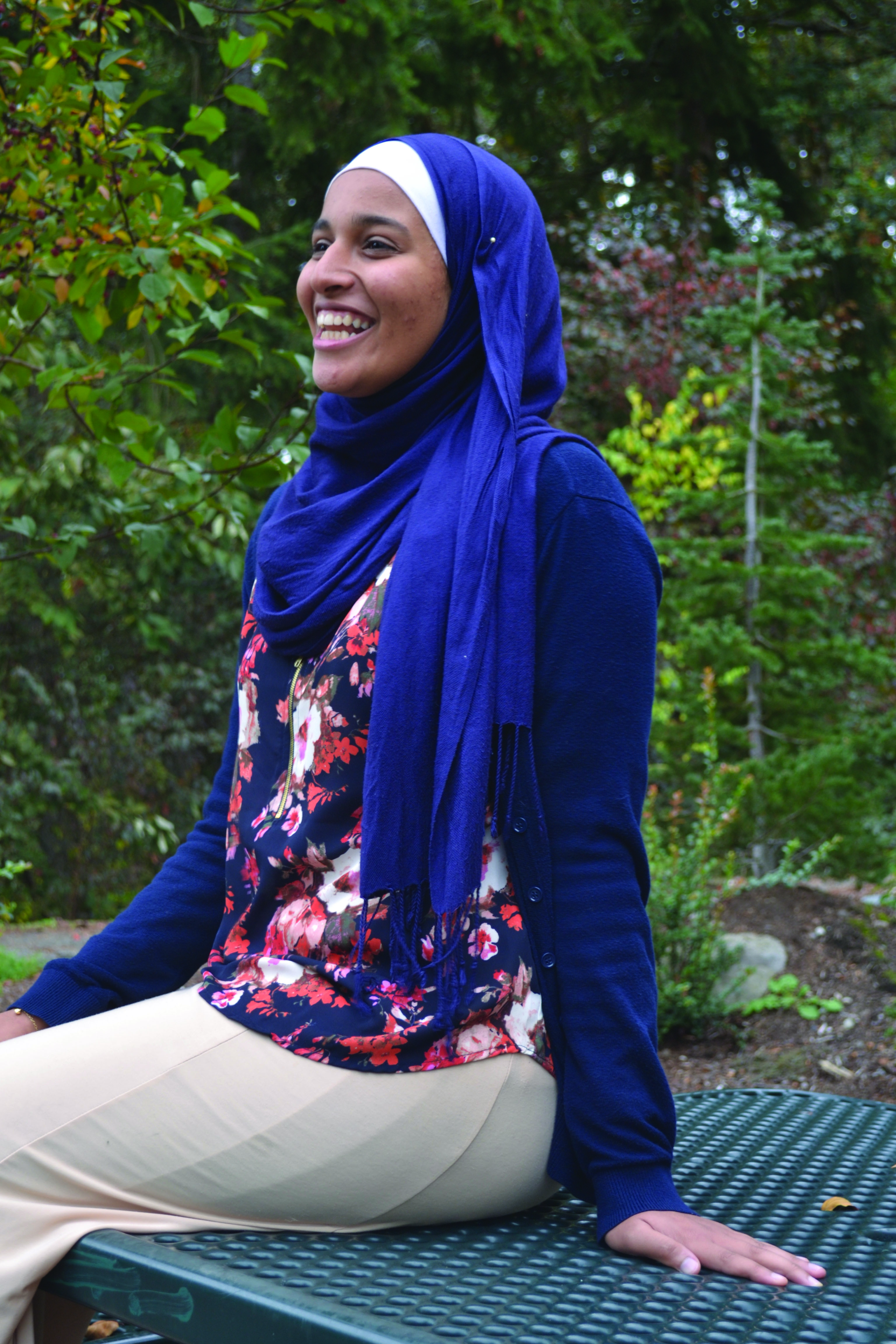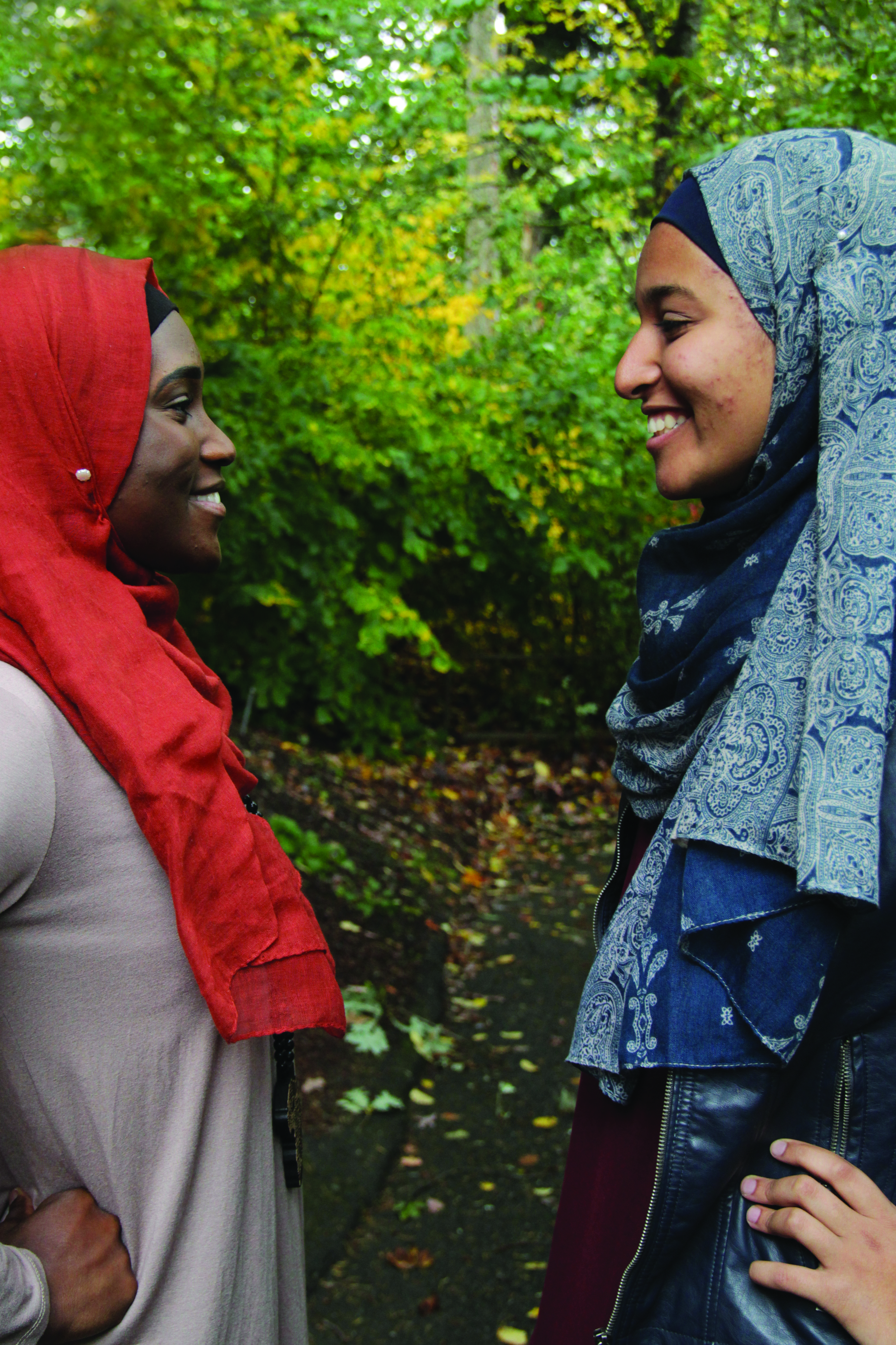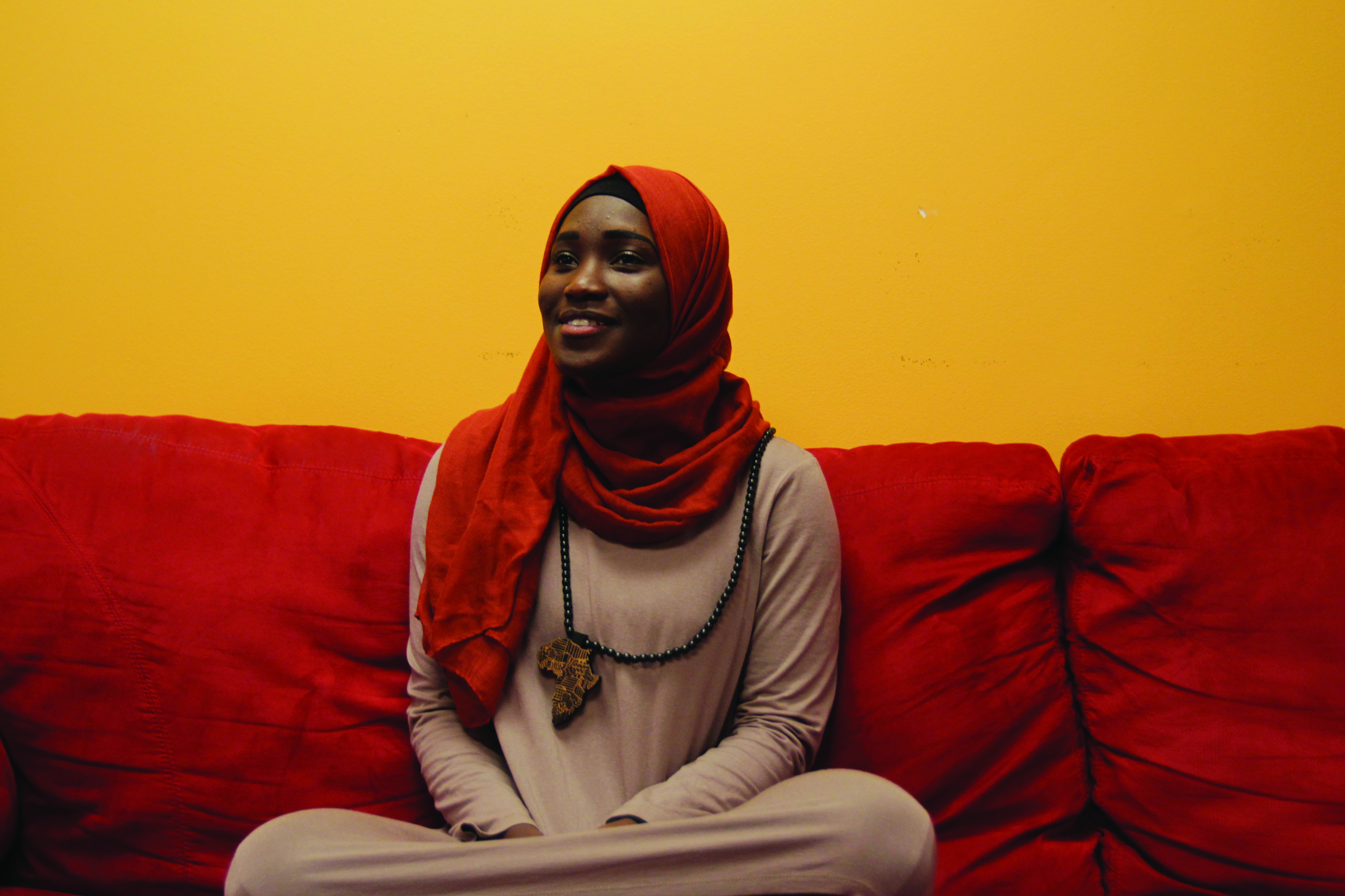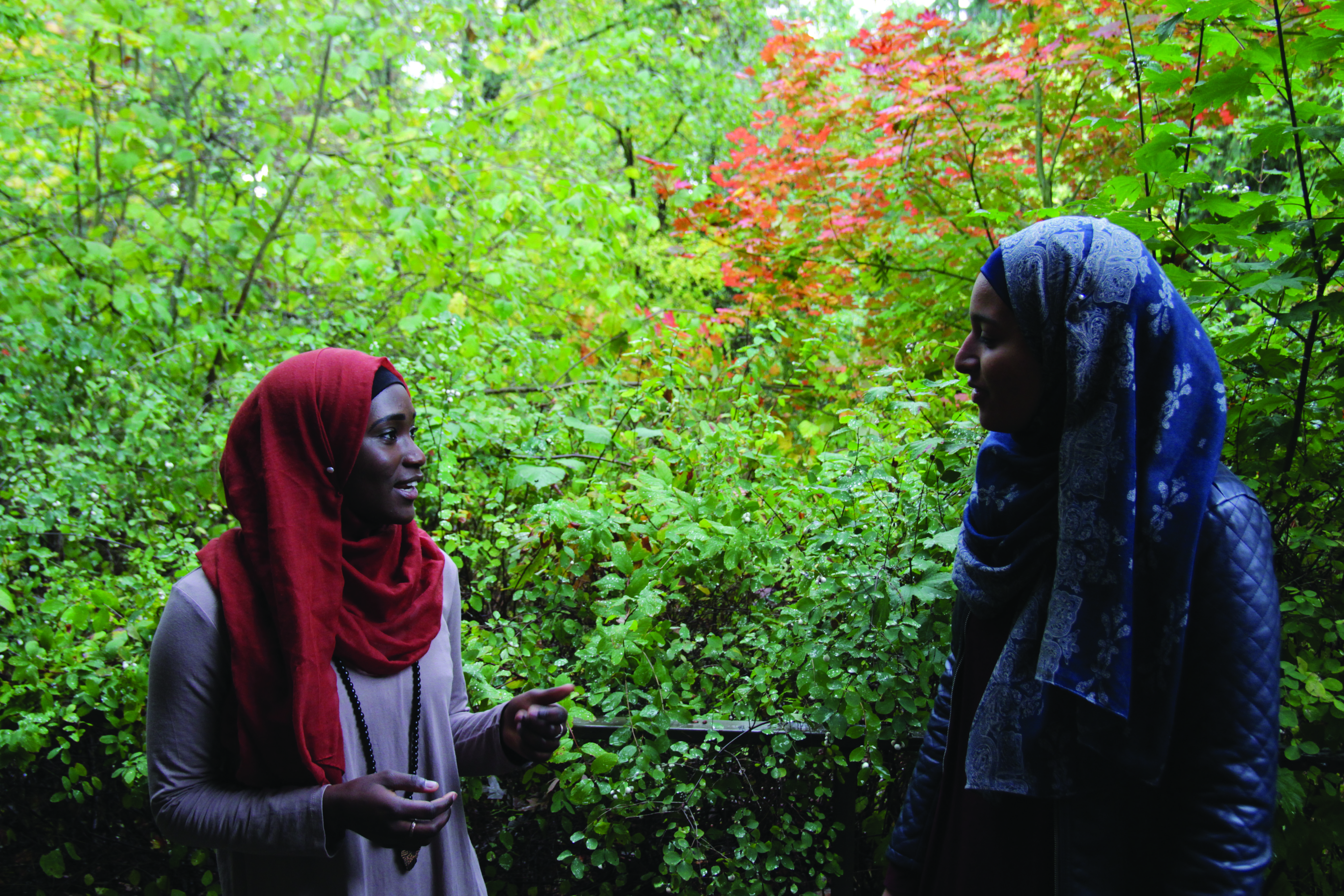BROOKE THAMES; Mast Magazine Editor; thamesbe@plu.edu
Muslim Lutes Alaa Alshaibani and Fatoumatta Conteh discuss being a religious minority on a Christian campus, their efforts to form a Muslim Student Union and their plight for a intersectional prayer space at PLU.
Senior Alaa Alshaibani remembers the day she wore a hijab for the first time. On a day like any other, Alshaibani — a fifth-grader at the time — readied for school in her hometown of University Place, WA. The morning was going as Alshaibani had expected until her mother surprised her with the traditional Muslim headdress.
“My mom just sprung it on me and said, ‘You’re gonna wear this today,’” Alshaibani mimics her mother’s words with a shrug. “‘Today and for the rest of your life,’ is essentially what that meant.”
Alshaibani immediately refused and a full-blown argument promptly ensued. She remembers running to her father, trying to convince him to let her go hijab-free. The battle was quickly lost.

Photo by McKenna Morin
“He just looked at me and was like, ‘Well…’ At that point, I knew it was over and I just started crying.”
For fifth-grade Alshaibani, the hijab meant she was different — and different was not something she wanted to be, especially as a preteen. She recalls her anxiety about fitting in — wanting “the Ugg boots, the North Face [jackets], and all the stupid things you think are so important when you’re a kid.”
She also remembers all of the compliments she received that day, when her mother dragged her to school regardless of what she wanted. To Alshaibani’s surprise, her classmates accepted her hijab with enthusiasm. From there, it didn’t take long for Alshaibani to accept the garment herself. In fact, she became attached to it quite quickly.
“I actually remember the next week I walked to school without it,” she laughs. “I saw my reflection on the door, and I was like, ‘Crap!’ So, I ran home and then started crying because I wasn’t wearing it and I was out in public.”
Since then, Alshaibani says she’s never felt like an outsider. Even now as a religious minority on a Lutheran campus, Alshaibani feels comfortable in the liberal atmosphere of Pacific Lutheran University. It’s an environment she admits surprised her upon her arrival as a first year.
Alshaibani attended a Fall Preview Day where she took a liking to the university. She heard about PLU’s affinity for inclusivity, but never imagined she would feel so at home on campus. Now, in her fourth year as a Lute, Alshaibani says she has “no regrets” about her decision to attend PLU.
“I didn’t hesitate too much,” she says. “I remember hearing people say that PLU was really liberal, so then I had no qualms in applying. I learned it was really liberal once I actually started.”
Alshaibani can count her experiences with stereotyping, ignorance and Islamophobia on one hand. She recalls a moment in the Tacoma Mall when a woman expressed concern that Alshaibani might “bomb her” simply based on the hijab she was wearing. Another instance involved students in her high school history class staring at her during a documentary on 9/11. Out of the limited negative encounters Alshaibani has experienced, less than half have occurred at PLU.

Photo by Oliver Johnson
The first came shortly after the start of Alshaibani’s first year. While attending a required presentation for first years, Alshaibani took an opportunity to share her uncertainty about being a Muslim student in a Lutheran context. She told other students in the room that she “felt like people would look at [her], like [she] wouldn’t fit in.”
After the presentation, a friend told Alshaibani about a comment muttered during her highly personal statement.
“She told me, when I shared that [feeling], someone in the audience said, ‘Then why did you even come here if you’re not Christian?’”
The harsh tone of the comment stung Alshaibani, but didn’t go so far as to make her feel like an outsider in the PLU community. However, her second experience with Islamophobic messages at PLU prompted her to take action.
Alshaibani studied away in London her junior year. Upon returning home, she tuned in to PLU’s Yik Yak feed and was surprised to find a slew of Islamophobic posts.
“I was so taken aback,” she shares.
In response, Alshaibani created her own post calling out the bigotry of the messages. She instantly received criticism. One commenter, Alshaibani remembers, bet that she was “just a white, male liberal trying to make a point.”
After reading that and other comments, Alshaibani felt uncomfortable on campus for the first time.
“I had never felt like that before. I remember thinking, ‘There needs to be an interfaith event.’”
With the Yik Yak feed at the back of her mind, Alshaibani went to the Diversity Center and spoke to faculty about creating an interfaith seminar. She hoped to gather a group of Muslim students to speak on a panel and answer questions posed by their peers regarding faith. The lack of Muslim-identified students on campus made that goal difficult to achieve.
Though Alshaibani never did host an interfaith seminar, she’s wanted to help foster religious intersectionality ever since. With the influx of Muslim-identified students this year, she and others are attempting to ratify a Muslim Student Association.
A collection of Muslim students recently began writing a club constitution and petitioning for a faculty advisor. Sophomore Fatoumatta Conteh plays a hands-on role in the formation of the club.
Unlike Alshaibani, Conteh felt some nervousness about attending PLU as a Muslim. She says she did not know what to expect from a Christian university. The lack of a prominent Muslim community played a part in her concern.
“I think, sometimes, the general hesitance with attending a Christian school is not finding people like yourself, not finding other Muslims,” the nursing major says.
Despite the uncertainty, Conteh assured herself that she would be fine — especially after experiencing campus culture. She too calls PLU a “liberal” space, noting the Diversity Center and the community of LGBTQ students, faculty and staff.

Conteh describes her interactions with students as positive. Curious peers sometimes ask her questions about Islam and its practice, and Conteh is more than happy to answer.
“I appreciate that people ask me rather than assume. They try to get to know me. I consider that interfaith dialogue.”
As an extrovert, Conteh finds that boundaries quickly crumble with some friendly conversation and the flash of a warm smile.
“Sometimes people stare, but they don’t approach you. Then you smile at them, and you see them smile back.”
The biggest challenge is finding community, which the Muslim Student Association will attempt to remedy. In forming an MSA, Conteh and her partners hope to create a community for Muslim students on campus.
The idea for an MSA sprung out of an event Conteh organized. With a collection of other students, she hosted a celebration for Eid al-Adha, a holiday in the Muslim tradition that celebrates the willingness of Ibrahim to sacrifice his son in submission to God. Those who came were surprised to find such a prominent concentration of Muslim Lutes.
Campus Pastor Jen Rude, who attended the Eid celebration herself, says she was struck by the fact that the Muslim students didn’t know each other. When the idea for an MSA came up, Rude said she’d be happy to support the club through Campus Ministry.
“I’m just supporting from the ground and affirming that we absolutely need a Muslim Student Association on campus,” Rude says.
“I appreciate that people ask me rather than assume. They try to get to know me. I consider that interfaith dialogue.”
-Fatoumatta Conteh
Students interested in leading the MSA spoke to Rude about how to form a religious club. After gaining approval from Clubs and Organizations, the MSA must pass through the Campus Ministry Council, which signs off on any religious groups.
Conteh expresses thanks for Rude’s support.

-Campus Pastor Jen Rude. Photo by McKenna Morin
“[Campus Ministry] holds it as a priority that an MSA is something the university needs, which I appreciate,” she says.
While Muslim students feel an MSA is necessary, it isn’t their only need. Adjacent to the request for a club is the request for a space to pray. Conteh says she is one of several Muslim students on campus who lacks a place to conduct formal prayer. The library’s third floor often functions as a makeshift praying space, according to Rude and Conteh. If not in the library, many Muslim students report praying in the solitude of their own rooms.
Conteh, who sometimes prays in empty classrooms in the Hauge Administration Building, says a prayer space is the biggest need at the present moment. She notes Christian spaces like Ness Family Chapel and Lagerquist Concert Hall, which each hold various Christian services. For non-Christian students, however, provisions for religious or spiritual rites are scant.
“If you’re Christian, you can go to those places [for religious expression],” Conteh says of Ness and Lagerquist. “For Muslim students on campus, I’ve noticed we go to class and that’s it.”
Although Ness Family Chapel can be booked out for any purpose, Rude notes it as “definitely a Lutheran space.” What students request is an interfaith room where non-Christian Lutes — Muslim and otherwise — can meditate and pray with convenience.
Alshaibani agrees and says it should be called a “meditation space” to allow for intersectionality. She draws upon an example from the University of Washington Tacoma, where she visited a friend last year. At UW, a meditation room provides an open, interfaith space for students to express spirituality. Alshaibani remembers the space being supplied with prayer rugs, religious texts and even sinks for the Islamic practice of Wudu.
Wudu entails washing different parts of the body before prayer. Alshaibani says the feet are the hardest to wash, especially in a public restroom.
“You get really self-conscious when you’re in a public bathroom, wondering if someone will come in.”
At UW, the meditation room includes benches and low sinks for washing feet. According to Alshaibani, even the Islamic Center of Tacoma lacks that feature.
!["PLU is pretty good at [acknowledging] other religions, but it could definitely be better." -Alaa ALshaibani](https://mastmedia.plu.edu/wp-content/uploads/2016/10/Alaa-2.jpg)
-Alaa ALshaibani. Photo by McKenna Morin
Rude hopes to provide these accommodations in an interfaith space. However, finding a place on campus proves difficult due to lack of options. Currently, a storage room connected to the Cave stands out as a possible spot.
No matter where the space exists, Alshaibani and Conteh contend that an interfaith room is crucial to religious inclusivity on campus. Without it, interfaith dialogue remains stagnant.
“I feel like PLU does want diversity, intersectionality and all that great stuff,” Alshaibani says, “but in terms of religion, we have a long way to go.”
It’s because of PLU’s mission of thoughtful inquiry, service and care that Alshaibani particularly feels religious intersectionality should grow and religious expression should encompass all faiths.
“I think for a Christian school, PLU is pretty good at [acknowledging] other religions, but it could definitely be better,” she says with a strong nod. “It’s more than I would expect from a Christian school. But since it’s PLU, I expect more.”
















